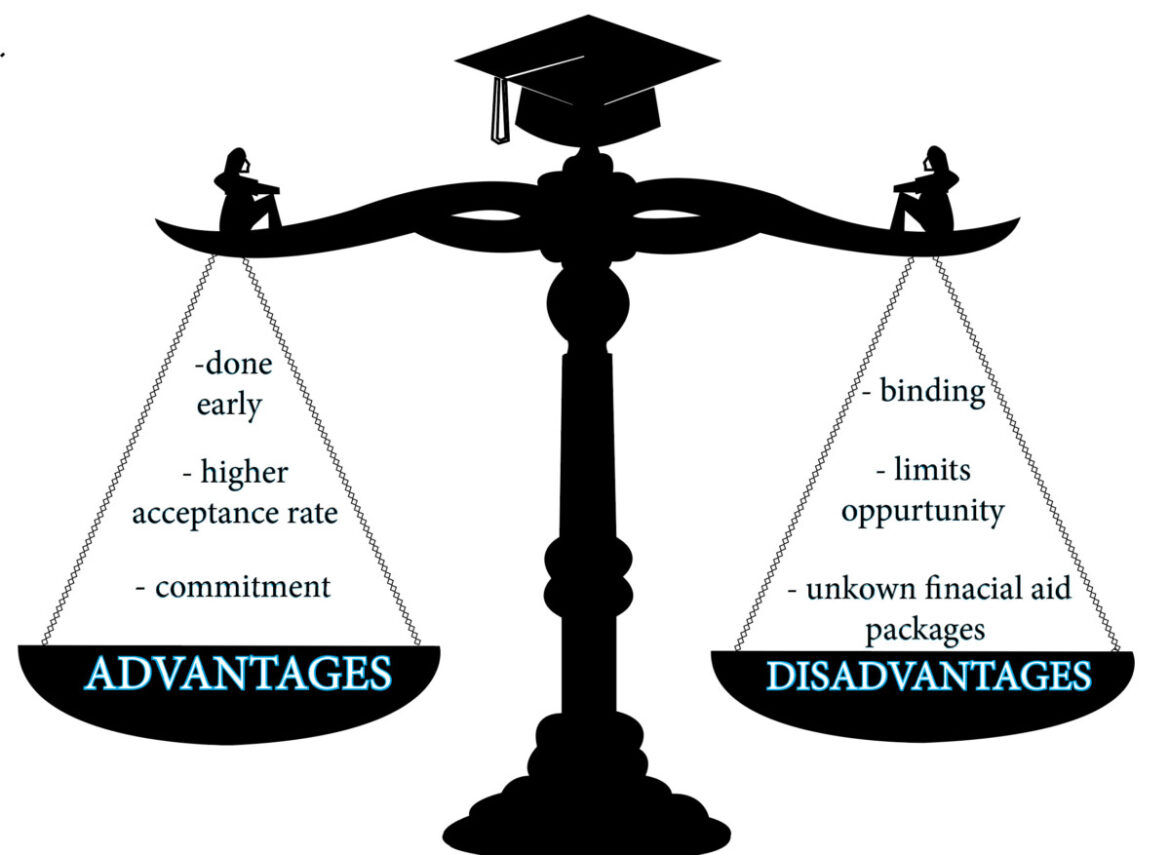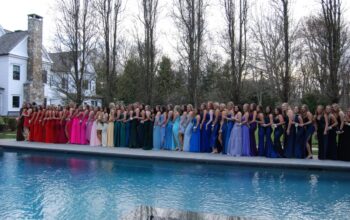Alessandra Gass, Features Editor
@agasscourant
As Seniors begin their college-application process, they are faced with several different admission options offered by sought-after universities. While the way in which colleges and universities choose their rising class tends to vary, there are generally three windows of application: regular, early action, and early decision. While it may seem like the distinction between application types solely revolve around their deadline, the choice to apply early can make all the difference in regards to acceptance – or rejection – from the school of one’s dreams.
Unlike Early Action (EA) and regular admission, Early Decision (ED) applicants are bound to the school upon acceptance. “If you find a college that you prefer above all others early enough in your senior year, you can make the choice to ED there,” College and Career counselor Susan Carroll said. “If you are accepted into that college, you have a binding contract to go there – you cannot go to any other colleges, regardless of acceptance.”
Early Action (EA) applications are due earlier in the year than regular applications. “Early Action is another timeline provided by colleges in which you apply early to the college, however, if you’re accepted, you’re not bound to go there,” Ms. Carroll said. “You can still flirt with other colleges, and you have flexibility in regards to changing your mind and applying to other schools.”
Senior Lexie Hirari was admitted to the University of Denver after submitting her Early Decision application, meaning that she will be attending in the fall. “After visiting the University of Denver early this year, I immediately fell in love with it. U of Denver stuck with me throughout all the college tours I went on,” Lexie said. “It was always on my mind, and I knew that I didn’t want to go anywhere else. Yes, I would be happy if I went somewhere else, but I knew that I’d be happiest there. There was a lot of second guessing leading up to the deadline for ED – I was worried that I was going to change my mind, and that I was just romanticizing Denver.”
In New Canaan, ED is a very common application type among students. Additionally, many students tend to apply to the similar schools, heightening competition across a grade. “This year, 44% of the senior class applied early decision, and even more applied early action, as there were 1459 early application transcripts sent.” This tells us that most applied to one school via early decision and a few early action in hopes that at least one pans out,” Ms. Carroll said.
“It doesn’t matter what college you go to, it matters what you do when you get to college.”
Susan carroll, college and career counselor
June Cochran, a senior committed to Tulane University, has personally experienced pressure from others, as the schools she showed interest in are typically applied to by many of her peers. “Tulane only accepts 104 regular applications, and especially being from New Canaan, we all apply to the same schools. For example, U Wisconsin-Madison had 61 people apply to it – and that’s not counting some regular decisions,” June said.
Tony Woods, a senior committed to Williams College, also feels pressure to apply ED due to the competitive nature of New Canaan. “Every year, there’s an Instagram account that posts all of the college decisions so you can see your friends and peers getting into schools. It’s very possible to feel left out if you don’t apply ED or get rejected from your ED,” he said.
When deciding to whether or not to apply Early Decision, Ms. Carroll recommends that students should keep their options open and do thorough research. “Spend the night on campus and go to classes or lectures, if you can. Oftentimes, colleges are very good at marketing. The backwards walking tour guide who takes you all over school saying amazing things may not illustrate each element of the school, so it’s important to dig deeper,” she said. “Students can also examine the college’s mission statement. They spell their goal out very specifically, and you should make sure that it aligns with your goals.”
Many choose to apply ED to certain colleges because it appears that there is a boost in admission rates, but this isn’t always the case. “When a college evaluates you as an applicant, they’re looking at a plethora of different factors. This includes grades, extracurriculars, honors or awards, and if they can count on you to enroll. By applying early decisions and committing ahead of time, that removes some uncertainty from the college, since they know that accepting you will guarantee your deposit and tuition,” Toby said.
“However, these higher acceptance rates can be a little bit misleading, as they include recruited athletes. At Williams, about 30% of each class is a recruited athlete. In the most recent ED round that I went through, it looks like the acceptance rate is boosted to about 27%. But, when you include the recruited athletes, that drops down to about 11%,” Toby said. “While this is higher than the overall acceptance rate, it’s not as big of an advantage as you think it may be.”
“If you feel like you need more time to think about what you want, then take that time.”
Toby Woods, senior
Even though choosing to ED does help students’ chances of receiving a letter of acceptance, it’s very common to be rejected or deferred, especially when applying to extremely rigorous schools. “If you get denied from your ED school, you are not alone. A big portion of people that get deferred or denied still end up loving their second choice,” Lexie said. “You will find happiness wherever you go, and while rejection is not ideal, maintaining a positive mindset is so crucial – it’s not the end of the world. Rejection is redirection.”
According to Toby, there are many different advantages to applying in the regular round as well. “One of the main ones is that you get to hear from a ton of different schools and compare them. If you get into 5 different schools, then you have a few more options and time to compare each one, which is opposed to ED since you get one choice,” he said.
Ultimately, Early Decision applications are not the end-all and be-all of the admissions process. “The process of applying to college is filled with self-discovery,” Ms. Carroll said. “There are 3000 colleges in the US – one of them is going to love you. There are so many amazing opportunities out there that, inevitably, you’ll be accepted to the college that is the right fit and you’ll be able to take full advantage of every single thing that they offer.”




